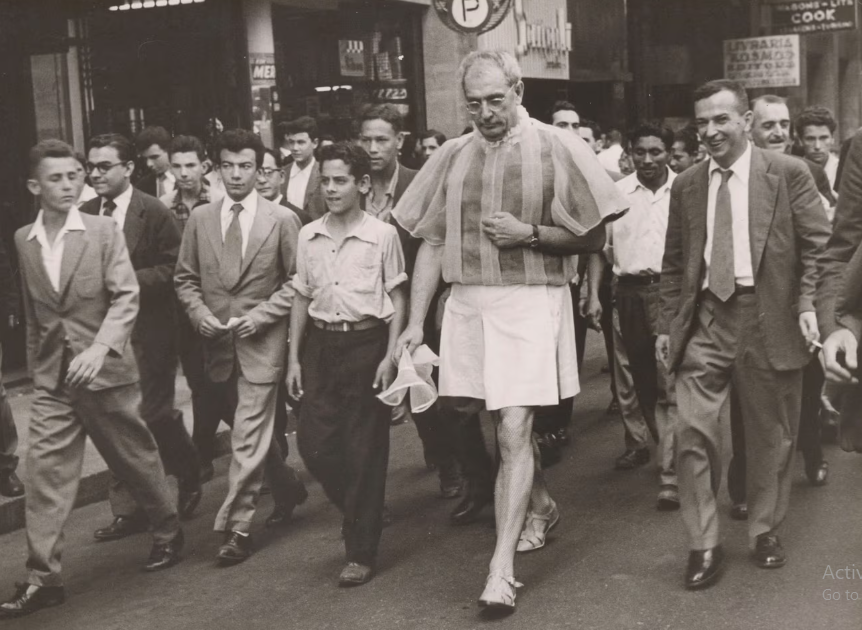ART & DESIGN

"ABNORMAL ART IS THE ONLY TRUE ART": HOW FLáVIO DE CARVALHO IGNITED A BRAZILIAN REVOLUTION
He wore a skirt to shock his conservative compatriots – and was swiftly taken to a police station for his own safety. As his work is featured in the Royal Academy’s exhibition, we celebrate a pioneer of modernism.
In 1931, during the Corpus Christi parade in central São Paulo, the Catholic faithful encountered a tall man walking against the crowd. As he moved through the procession, Flávio de Carvalho flirted with the men and ignored calls to stop his disruptive actions.
His Dada-inspired performance, Experience N. 2, which culminated with De Carvalho being escorted to a police station for his own safety, marked Brazil's first instance of performance art. However, the artist never achieved the international acclaim of his peers, possibly due to his refusal to create work that conformed to prevailing trends. "The performances were highly provocative and stirred controversy in a very conservative Catholic country; he was also constantly shifting from art to architecture to journalism, making it difficult to categorize him," says Adrian Locke, chief curator at the Royal Academy. "De Carvalho himself declared, ‘Abnormal art is the only good art.’ The artist, who passed away in 1973, now takes center stage at the Royal Academy in Brasil! Brasil!, a survey of Brazilian modernist art, alongside other prominent figures like Tarsila do Amaral and Lasar Segall. While De Carvalho’s six paintings in the exhibition share an interest in cubism and surrealism, his work stands out for its erotic and rebellious sensibility, contrasting with the more intellectual styles of the other artists displayed. "It’s incredible how different his paintings are compared to the ones shown alongside them, even though they were created around the same time," says Locke. "It will offer a distinct experience for viewers, shifting from the realism that preceded him to these daring portraits with radically unique color choices, bold, aggressive brushwork, and esoteric titles."
One of his works, The Inferiority of God, painted the same year as his infamous performance, portrays a massive nude figure walking through a city, with downward steps symbolizing a descent into hell. Another provocative piece, Our Lady of Desire (1955), depicts a highly abstract female figure in fleshy pinks and purples. De Carvalho explained, "For me, it was perfectly natural to find the origin of things in sex. After all, don’t we owe our own existence to sex?"
Born in 1899 to a wealthy family, De Carvalho was sent to boarding school in England as a teenager and later earned an engineering degree at Durham University. His only formal art education came through evening painting classes, but during his time in Britain, he connected with some of the country’s leading avant-garde figures, such as Roland Penrose and Ben Nicholson. Upon returning to Brazil in 1922, his father, a coffee grower, pushed him toward full-time work in construction, but De Carvalho quickly grew disinterested. “He had a disruptive spirit and a broad range of interests,” says Kiki Mazzucchelli, who has curated several exhibitions on the artist. “While in Britain, he devoured books on anthropology, history, and Freud. He was fascinated by the discovery of Tutankhamun, which sparked his deep interest in ancient civilizations and his desire to understand humanity.”
"This represents a significant development in our ongoing coverage of current events."— Editorial Board









